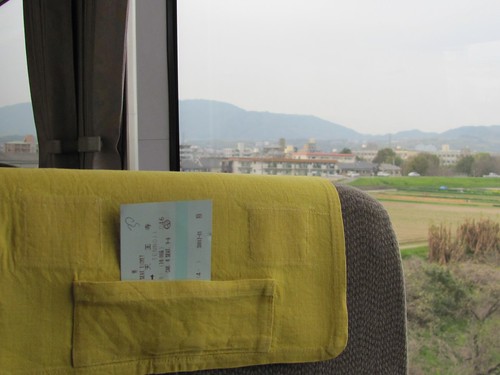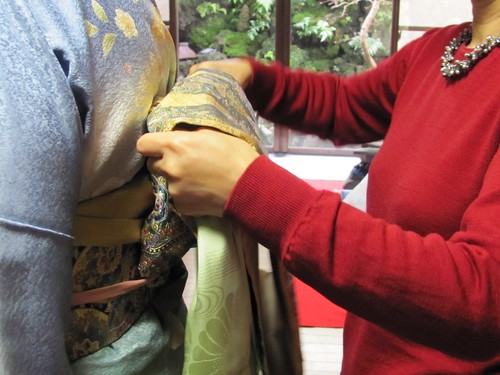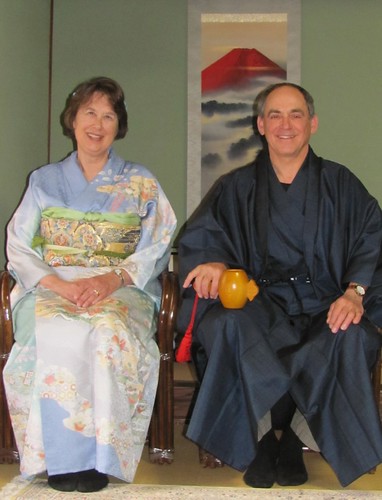Japan Trip 2010 — Day 12b
While munching the sushi lunch purchased on the platform, we watched a blue uniformed crew enter the conventional express train and whiz through the car cleaning, polishing and turning all the seats around. Five minutes later we boarded for the short trip to Osaka, noting the freshly ironed seat reservation sleeves.

Our rendezvous was anticipated for years. Jan had wanted to return to Japan after she visited with her mother for the wedding in 1980, and I’d had a yen to go since first seeing Kurosawa films in college. Emma was born in Kobe, and both girls spent time with their mother’s family in Osaka most summers, acquiring proficiency in the language. Our plan to join them there two years earlier was sidetracked by Emma and Travis’ wedding in Playa del Carmen, where we met “older sister,” Jung-ja, aka You-ki, who invited us to her house.
She stood waiting for us at Tennoji station, too stylish and graceful for a California hug, but brimming with affection. She grabbed Jan’s suitcase, ushered us into a cab, apologized and insisted on paying. Unfortunately, she said, her husband was in Hong Kong for an ancient coin-collectors convention and couldn’t meet us, but he left her lots of money to entertain her guests. She thanked us for helping to finance the nieces’ trip. She loved spending time with them and Taylor and Travis, whose name she pronounced with special relish.
They are all in Nara for the day, she said, and will meet us tonight for dinner at a Korean restaurant downtown owned by her friend. That left almost four hours for the three of us alone, which made me a bit apprehensive. Her English was halting, and she relied on a little hand-held computer to translate. But as she unlocked her house and we took off our shoes in the entry, I was put at ease. It welcomed us with the smell of burning incense and a striking arrangement of objects d’art.

Down the lustrous wooden floors of the hallway, she slid open some soji doors to reveal a large tatami room facing an enclosed garden. “This is yours.” “Travis and Emma are in the back””two tatami rooms away facing another enclosed garden, “and Marie and Taylor are upstairs.”
After we dumped our baggage in the corner, she invited us into the western-style sitting room across the hall for tea. She brought out a cake plate with five rich pastries we both declined, and then started the gift giving, by now a familiar and welcome ice-breaking ritual. I offered a copy of the Cal Poly Land Field Guide, and a bottle of plum wine from the Kanazawa brewery. She presented us a gold leaf fan and a round lacquered box.
Then it was time to talk about our shared nieces and their menfolk and to exchange gossip about other family members on both sides of the Pacific. Jan mentioned the recent death of her mother, and You-ki remembered her earlier visit. I dug the computer out of my pack and showed a set of pictures that Jan had taken at the time which I ‘d recently scanned. She brought out photos of the nieces as little girls playing with their cousins.

After we described our recent Kabuki adventure, she led us to the music room and to my amazement pointed out pictures of herself in costumes like the ones we’d seen in the Noh Museum.

She said that recently her opportunities had been exploding; her manager wanted her to perform all the time, but she needed to keep balance in her life. She explained that at age 34, she’d walked past Osaka’s Noh theatre, not far from her house, and been struck by the sound of the drum. She’d gone inside and begged for a chance to learn to play. Though the knowledge was usually passed from father to son and women were almost unheard of as performers, she persisted, studied and practiced for 20 years. Not long ago she’d finally got her license as drummer, singer and actor.
Her most recent enthusiasm was a different kind of drum, which she gestured toward on a stand.

It looked like a flying saucer made of brass. She said she’d heard it played briefly and decided to pursue the creator”a woman in Switzerland whom she visited and bought one from. She’d done a small recital for Japanese musicians a few months ago and they were so eager for more, she’s got a large concert scheduled for early next month. She said Travis played it last night, “very beautiful.”
I asked her to play for us, so she brought it to the sitting room and touched its various indentations lightly with her fingertips making throbbing silky sounds, like a mix of vibraharp’s and finger piano’s. I dared to bring out my little soprano recorder and we improvised together for ten minutes.
After another pot of tea, I asked if we could see some of her kimonos, having noticed the large chest of narrow drawers in the middle tatami room. Each was filled with several thick paper envelops fastened together with ribbons. She slowly untied the knots on six or seven of them and hung the treasures up on special straight hangars.

I asked if she would play dress-up with Jan, who after her initial reluctance I knew would get into it because of her experience in theatrical costuming. From another chest, You-ki unpacked half a dozen Obis, even more luxurious fabrics, to drape around the waist and tie in an elaborate knot at the back of the kimono.

Then she laughed and set to work.


The design was sakura.

She dressed me in a heavy silk yukata that would be worn by a samurai, put a mysterious wooden scepter in my hand, and took our portrait.

As she slowly packed away the precious garments, her daughter called to say that we were late to the restaurant. Another cab waited for us at the door and drove half an hour to a lantern-lit district of narrow streets.

We were greeted by the owner and conducted upstairs to a dining room full of young people including the four Americans.

All the rest were female: Ryoko, You-ki’s daughter who’d been our email go-between,

Choon-ja, middle sister, and her three daughters. The men were all at work. Chuoon-ja’s husband phoned to welcome us and send his regrets.

We sat around a table cooking endless portions of Wagyu beef and other delicacies.

After a couple of beers, the conversation turned to arranged marriages, and I announced that from where I stood now, they seemed like a good idea, given the importance over time that families and combining families has taken on. But I mentioned that this wasn’t always my opinion. Jan and my parents met the first time at our wedding and the one thing that our two mothers agreed upon was that it was a bad idea. I learned later in the evening from Emma, that this was a painful subject on various counts and I hoped that perhaps the language barrier spared the others from my ramblings.
Back home at You-ki’s we stayed up long past my bedtime with our fellow foreigners regaling each other with travel stories and pictures and anticipating tomorrow’s excursion westward.
